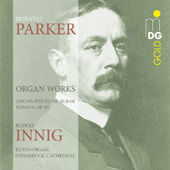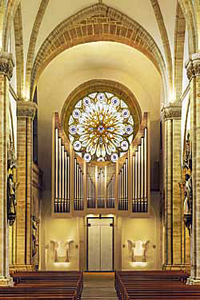
ESSENTIAL RECORDINGS


1) Four Organ Pieces, Op. 66
- Festival Prelude
- Reverie
- Scherzino
- Postlude
2) Sonata Op. 65
- Allegro Moderato
- Andante
- Allegretto
- Fugue
3) Five Organ Pieces Op. 68
- Canon in the Fifth
- Slumber-Song
- Novelette
- Arietta
- Risoluto
Horatio Parker (1863-1919) was an important American composer, teacher and organist who sat between tradition and innovation,
straddling the 19th and 20th centuries. He formed the link between the old and new musical worlds. His teachers, both ultra-conservatives, were
George Chadwick in America and Joseph Rheinberger in Europe, and later, while teaching at Yale University, one of his own students was none other
than the ultra-modern Charles Ives. Even though at the time he was viewed as a gifted musician composing in an advanced style, he remained an
unswerving conservative all his life with both feet firmly planted on the 19th century side of the fence.
He wrote substantial works for the orchestra, including one symphony, and therefore his organ music seems an extension of his orchestration palette.
More in line with composers like Théodore Dubois and Léon Boëllmann, his use of a strong melodic line with harmonic support far outweighs his
talents for counterpoint. Even the Fugue of his Sonata Op. 65 is rather opaque and far-removed from
the open and free flowing counterpoint of a Bach fugue for example. Parker's melodic gifts on the other hand are readily apparent. The
Slumber-Song and Festival Prelude both great examples of just that. He also avoids the tendency
to overburden his organ works with endless successions of heavy chordal passages, like so many other composers, and instead relies on his strong
and inventive melodies to drive the music forward.
Organist Rudolf Innig's choice of this new Kuhn Organ in the Osnabrück Cathedral could not have been more adequate for this
type of organ music. With its many Principal, String and Reed stops it fits the orchestral character of each piece very well, but is also bright and
airy enough to avoid sounding to much like a typical "French" organ. This recording makes for an excellent addition to any organ music collection.
Jean-Yves Duperron - May 2012